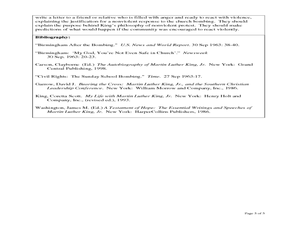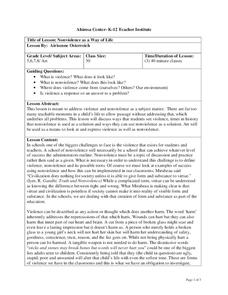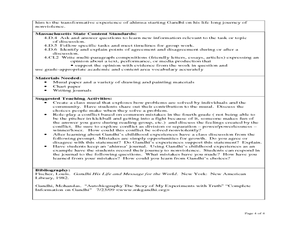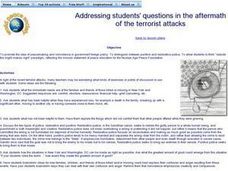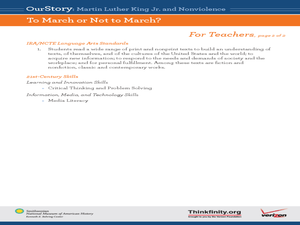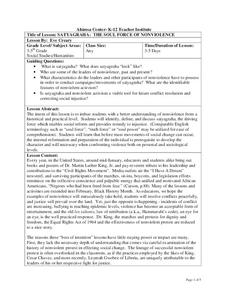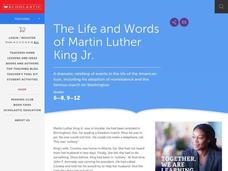PBS
Martin Luther King Jr.: Civil Rights Leader
Expand class members' appreciation of the work of Dr. Martin Luther King, Jr. A powerful resource examines King's speeches, writings, and actions that reveal his deep commitment to a nonviolent approach to Civil Rights. Learners watch a...
Beacon Press
A Time to Break Silence
Encourage teenagers to get involved in ending violence among young people. A Common Core-aligned resource and curriculum guide, designed to be used with a reading of A Time to Break Silence: The Essential Works of Martin Luther King,...
Curated OER
Dr. King’s Leadership in the Aftermath of the Bombing of Birmingham’s Sixteenth Street Baptist Church
Students explore the concept of nonviolent resistance. In this nonviolent resistance lesson, students consider how Dr. King led during the aftermath of the bombing of Birmingham's Sixteenth Street Baptist Church.
Curated OER
Civil Rights Leader: Rosa Parks
All humans should have civil rights, but that wasn't the case in Alabama. This biographical presentation shares information about the life and inspiration that Rosa Parks brought to the Civil Rights movement. It explains her thoughts,...
Curated OER
Nonviolence as a Way of Life
Students investigate the example Gandhi set for others to not engage in violence when being oppressed. In this rebellion lesson, students identify violence and discuss how it is used and often ineffective. Students create a visual...
Curated OER
Gandhi's Childhood Experience of Truth and Nonviolence
Fourth graders investigate philosophy by researching the life of Mahatma Gandhi. In this historical biography lesson, 4th graders examine the peaceful philosophy of India's most famous resident. Students participate in role-playing...
Curated OER
Addressing Student's Questions in the Aftermath of the Terrorist Attacks
Learners discuss peacemaking. In this political policy and emotions lesson, students explore ideas for expressing feelings in the aftermath of September 11, 2001. Learners reflect on punitive and restorative justice.
Curated OER
Rev. Dr Martin Luther King, Jr. meets the Philosophy of Gandhi's Ahimsa
Students study Gandhi's and Dr. King's philosophies. In this world history lesson, students compare and contrast the methods by Gandi and Dr. King writing an essay on nonviolence.
Curated OER
A Comparison of Two Great Leaders: Mahatma Gandhi and Martin Luther King Jr.
Students explore these two leaders use of nonviolent protest techniques. They read about the life of King Jr. They view a slide show about the life of Gandhi. Compare/contrast the lives of these two men using a Venn diagram.
Curated OER
The Power of Autobiographical Writing
Students explore the concept of injustice. In this nonviolent resistance instructional activity, students discuss how autobiographical writing may be used to promote justice. Students read an excerpt from Gandhi's autobiography and...
Macmillan Education
Communicate/Cooperate
Prepare pupils to communicate effectively throughout their lives with this set of worksheets and activities, which are part of a 23-lesson series on valuable life skills. Class members will define communication and cooperation, discuss...
Albert Shanker Institute
Who Was Bayard Rustin?
Who was Bayard Rustin? Pupils analyze a series of primary source documents to learn about this important figure in the civil rights movement. The lesson contains a short film to watch along with guiding questions and other resources...
Newseum
Making a Change: Letter From Birmingham Jail
Martin Luther King Jr.'s "Letter From Birmingham Jail" was written in response to "A Call for Unity," written by eight white ministers from Birmingham and published in the local newspaper. After reading both letters and following a list...
Curated OER
To March or Not to March?
Students read historical artifacts about the March on Washington for Jobs and Freedom and analyze the choices made during the time. In this March on Washington lesson, students read Martin's Big Words and the 'Step Back in Time' sheets....
Curated OER
Satyagraha: The Soul Force of Nonvilence
Pupils discuss what satyagraha is understanding that it is the driving force which enables social reform. In this social science lesson, students try to internalize the principles of nonviolence on an individual level and then a global...
Curated OER
The March from Selma to Montgomery
Students examine voter discrimination. In this Civil Rights lesson, students watch segments of "Eyes on the Prize" and discuss the organization of the march from Selma to Montgomery. Students conduct interviews to learn personal stories...
Curated OER
Looking for Heroes
Students explain the importance of the 1965 Selma-to-Montgomery Voting Rights March and the long term impact in the US of non violent civic participation.
Curated OER
Selfless Service and The Giving Tree - Building Ethical Conscience
Upper elementary schoolers investigate philanthropy and selflessness by reading a children's book. In this ethics lesson, they read The Giving Tree by Shel Silverstein, and research Mahatma Gandhi's troublesome, yet inspiring, life....
Tolerance
A Time for Justice
The Academy Award-winning documentary A Time for Justice launches a unit that examines America's civil rights movement. Class members examine key events and participants in the movement and consider how the civil rights movement changed...
Scholastic
The Life and Words of Martin Luther King, Jr.
Here is a precise article explaining chronological events that led Martin Luther King, Jr. to march for freedom and civil rights.
Curated OER
The Art of Protesting
Young scholars view various images to examine different types of protest Americans have used throughout history, and explore ways in which protest can produce change for better or worse.
Curated OER
Cartoons and Protest
Students examine political cartoons from 1774 through today, determine their meanings through analysis and discussion, and create their own political cartoons focusing on historical issues studied in class.
Curated OER
Gandhi Speech Writing
Explore non-violent protest in this social values and world history lesson. After viewing the movie Gandhi, and discussing important events in Gandhi's life, young orators write a speech defending Gandhi's position on the value of...
Curated OER
Applying Ahimsa to Traditional Stories
Investigate the life of Mahatma Gandhi by researching non-violent lifestyles. Learners define the word ahimsa and discuss the personal characteristics that made Gandhi a peaceful warrior. They also create a poster about the story "The...
Other popular searches
- Nonviolence Gandhi
- Nonviolence Speech
- Nonviolence Protests
- Nonviolence India
- Nonviolence Bullying
- Nonviolence Fifth Grade
- Nonviolence Gandi
- Nonviolence 4th Grade
- Nonviolence Candi
- Nonviolence + Gandhi
- Nonviolence Northern Ireland




